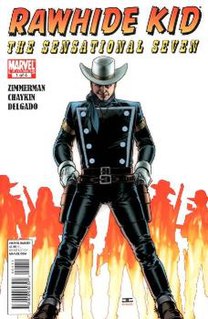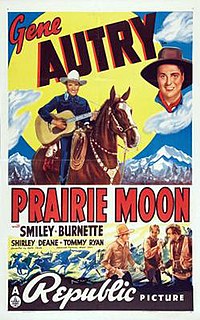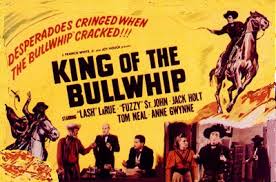
The Dalton Gang was a group of outlaws in the American Old West during 1890–1892. It was also known as The Dalton Brothers because four of its members were brothers. The gang specialized in bank and train robberies. During an attempted double bank robbery in Coffeyville, Kansas in 1892, two of the brothers and two other gang members were killed; Emmett survived and was captured, tried, and convicted. He was paroled after serving 14 years in prison.

The Rawhide Kid is a fictional Old West cowboy appearing in American comic books published by Marvel Comics. A heroic gunfighter of the 19th-century American West who was unjustly wanted as an outlaw, he is one of Marvel's most prolific Western characters. He and other Marvel western heroes have on rare occasions guest-starred through time travel in such contemporary titles as The Avengers and West Coast Avengers. In two mature-audience miniseries, in 2003 and 2010, he is depicted as gay.

Commodore Perry Owens was an American lawman and gunfighter of the Old West. One of his many exploits was the Owens-Blevins Shootout in Arizona Territory during the Pleasant Valley War.

Destry Rides Again is a 1959 musical comedy with music and lyrics by Harold Rome and a book by Leonard Gershe. The play is based on the 1939 film of the same name.

John Henry Selman was sometimes identified as an outlaw and sometimes a working lawman of the Old West. He is best known as the man who shot John Wesley Hardin in the Acme Saloon in El Paso, Texas, on August 19, 1895.

Willard "Bill" Kennedy was an American actor, voice artist, and host of the long-running Detroit-based television show, Bill Kennedy at the Movies. He began his career as a staff announcer in radio; Kennedy's voice narrates the opening of the television series Adventures of Superman.

Three Violent People is a 1957 American Western film directed by Rudolph Maté and starring Charlton Heston, Anne Baxter, Gilbert Roland, Tom Tryon, Forrest Tucker, Bruce Bennett, and Elaine Stritch.

Rancho Deluxe is a 1975 Neo-Western comedy film directed by Frank Perry. Jeff Bridges and Sam Waterston star as two cattle rustlers in modern-day Livingston, Montana, who plague a wealthy ranch owner, played by Clifton James.

Rawhide is a 1938 American Western film starring Lou Gehrig and made by Twentieth Century-Fox Film Corporation. The movie was directed by Ray Taylor and produced by Sol Lesser from a screenplay by Jack Natteford and Daniel Jarrett. The cinematography was by Allen Q. Thompson. This is the only Hollywood movie in which baseball great Lou Gehrig made a screen appearance, playing himself as a vacationing ballplayer visiting his sister Peggy on a ranch in the fictional town of Rawhide, Montana. The film remains available on DVD and VHS formats.

Mason Frakes Dalton, called Bill Dalton, was an American outlaw in the American Old West. He was the co-leader of the Wild Bunch gang and he was the brother of the founders of the Dalton Gang, Gratton, Bob and Emmett.

Man with the Gun is a 1955 American black and white Western film starring Robert Mitchum. The film was released in the United Kingdom as The Trouble Shooter and is also sometimes entitled Deadly Peacemaker. The supporting cast includes Jan Sterling and Karen Sharpe. The film was written by N. B. Stone Jr and Richard Wilson and directed by Wilson.

The Kansan is a 1943 Western film directed by George Archainbaud. The film is also known as Wagon Wheels in the United Kingdom.
The Vigilantes Return is a 1947 Western film directed by Ray Taylor. Produced by Universal Pictures in Cinecolor, it was shot in Iverson Ranch in Chatsworth, Los Angeles, California.

Arizona Bound is a 1941 American Western film directed by Spencer Gordon Bennet. This is the first film in Monogram Pictures' Rough Riders series, and stars Buck Jones as Marshal Buck Roberts, Tim McCoy as Marshal Tim McCall and Raymond Hatton as Marshal Sandy Hopkins, with Luana Walters, Dennis Moore and Kathryn Sheldon.
Rustlers is a 1949 American Western directed by Lesley Selander. The film is a Tim Holt B Western about a group of Arizona ranchers intent on stopping a gang of cattle rustlers.

Prairie Moon is a 1938 American Western film directed by Ralph Staub and starring Gene Autry, Smiley Burnette, and Shirley Deane. Written by Betty Burbridge and Stanley Roberts, the film is about a singing cowboy who takes care of three tough boys sent west from Chicago after their father dies and leaves them a cattle ranch.

Young Fury is a 1965 American Western film directed by Christian Nyby and written by Steve Fisher. The film stars Rory Calhoun, Virginia Mayo, William Bendix, Lon Chaney Jr., Richard Arlen and John Agar. The film was released in February 1965, by Paramount Pictures.

Rails Into Laramie is a 1954 American Western film directed by Jesse Hibbs and written by D.D. Beauchamp and Joseph Hoffman. The film stars John Payne, Mari Blanchard, Dan Duryea, Joyce Mackenzie, Barton MacLane and Ralph Dumke. The film was released on April 14, 1954, by Universal-International Pictures.

King of the Bullwhip is a 1950 American Western film produced and directed by Ron Ormond starring Lash LaRue and Al "Fuzzy" St. John. It was the eighth of LaRue's films for Ormond's Western Adventures Productions Inc. The film was the second to be released by Howco, Ron Ormond's new film company composed of Ormond and drive-in movie owners Joy N. Houck and J. Francis White, and Ormond's first film as director. The screenplay is co-written by Jack Lewis and Associate Producer Ira S. Webb. Jack Holt and Tom Neal return from the previous film but in different roles. The film was shot at the Iverson Movie Ranch.

Outlaws of Stampede Pass is a 1943 American Western film directed by Wallace Fox and written by Adele Buffington. This is the fourth film in the "Marshal Nevada Jack McKenzie" series, and stars Johnny Mack Brown as Jack McKenzie and Raymond Hatton as his sidekick Sandy Hopkins, with Ellen Hall, John Dawson, Harry Woods and Charles King. The film was released on October 15, 1943, by Monogram Pictures.

















